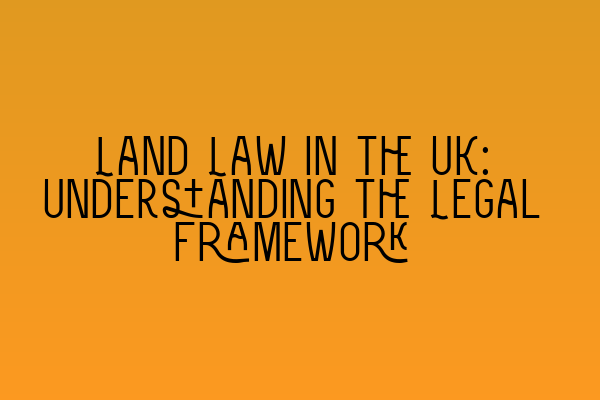Land Law in the UK: Understanding the Legal Framework
Welcome to SQE Property Law & Land Law, where we aim to provide you with comprehensive information and guidance on various aspects of land law in the UK. Whether you are a solicitor, a law student preparing for the SQE exams, or simply someone interested in understanding the legalities surrounding land, this blog post is here to enlighten you.
The Importance of Land Law
Land law holds significant importance in the UK legal system as it governs the rights, ownership, and use of land. It establishes the legal framework that facilitates the buying, selling, leasing, and development of property. Understanding the principles of land law is crucial for solicitors, as it forms the basis for resolving disputes, drafting contracts, and providing legal advice.
Key Concepts in Land Law
Before delving deeper into the UK’s legal framework for land, let’s familiarize ourselves with some key concepts:
1. Freehold
A freehold estate grants the owner complete ownership and rights over the land indefinitely. It is the highest form of ownership and provides the owner with the right to use, sell, lease, and develop the property without any time restrictions.
2. Leasehold
A leasehold estate, on the other hand, grants the holder temporary ownership rights for a specific period. Leaseholders have the right to occupy and use the property, subject to the terms and conditions stipulated in the lease agreement.
3. Easements
Easements are legal rights granting a non-owner the privilege to use and access a property for specific purposes. Common examples include rights of way and rights to utilities such as water, gas, or electricity.
4. Covenants
Covenants refer to legal obligations attached to the land that bind both the original owner and subsequent owners. These obligations can relate to specific uses of the land, maintenance responsibilities, or restrictions on development.
The Legal Framework for Land in the UK
Land law in the UK is governed by a combination of statutes, common law, and equity. The primary legislations that oversee land rights and ownership include:
1. Law of Property Act 1925
The Law of Property Act 1925 establishes the foundational principles of land law, including the distinction between freehold and leasehold estates, the formalities for transfer of land, and the creation of equitable interests.
2. Land Registration Act 2002
The Land Registration Act 2002 introduced a compulsory system of land registration in England and Wales. It aims to provide certainty and transparency in land ownership by recording all relevant information in an official register, known as the Land Registry.
3. Landlord and Tenant Act 1954
The Landlord and Tenant Act 1954 regulates the rights and obligations of landlords and tenants, particularly concerning lease renewal, rent reviews, and tenant security.
Understanding Land Law for the SQE Exams
If you are a law student preparing for the SQE exams, it is essential to have a strong understanding of land law. The SQE exams assess candidates’ knowledge and competence in various practice areas, including property law. That’s why we offer SQE 1 and SQE 2 preparation courses to help you thoroughly prepare for the exams.
To further enhance your preparation, we recommend practicing with our SQE 1 practice exam questions and SQE 1 practice mocks FLK1 and FLK2. These resources will familiarize you with the format of the exams and allow you to assess your knowledge and identify areas for improvement.
Conclusion
Land law in the UK provides the legal framework that governs the rights, ownership, and use of land. Understanding the key concepts and the relevant legislation is vital for solicitors, law students, and anyone involved in property transactions. At SQE Property Law & Land Law, we are committed to providing you with valuable insights and resources to help you navigate the intricacies of land law.
For more information on our SQE 1 and SQE 2 preparation courses or to check the latest SRA SQE exam dates, please visit our related articles:
- SQE 1 Practice Exam Questions
- SQE 1 Practice Mocks FLK1 FLK2
- SQE 2 Preparation Courses
- SQE 1 Preparation Courses
- SRA SQE Exam Dates
